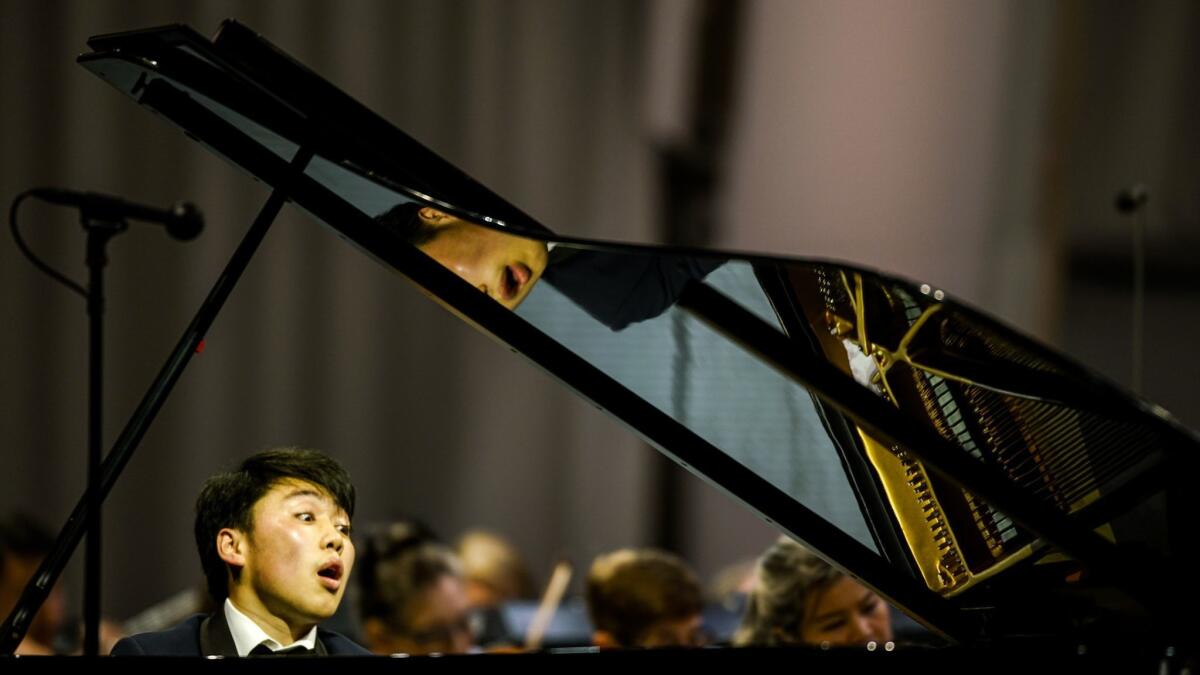Review: A young pianist helps Grieg feel fresh again at the Bowl

The other day a friend on holiday in Bergen texted a photo of a pigeon perched on the head of a statue of the city’s most famous native son and Norway’s best-known composer. The bird’s droppings streaked poor Edvard Grieg’s face.
No problem. A cleanup crew happened to be on hand, if 5,000 miles away at the Hollywood Bowl. Thursday night a rising-star 22-year-old pianist from Boston, George Li, and a Spanish conductor who has lately revitalized the Luxembourg Philharmonic, Gustavo Gimeno, made their Bowl debuts administering a scrupulous Los Angeles Philharmonic all-Grieg program.
This included the Grieg — the Piano Concerto and the two “Peer Gynt” suites — everyone knows and loves. The Grieg adapted for the musical “Song of Norway,” the Grieg Duke Ellington made swing, the Grieg the Who and Big Brother and the Holding Company rocked to in the 1960s, the Grieg suited to heavy metal and K-pop, the Grieg that has found its way into films and cartoons from the era of the silents to “The Social Network.”
Next to all that the composer has accrued, then, bird poop is barely a blip in the Grieg-O-Sphere. And it appeared to be the intent of Li and Gimeno in the overly familiar Piano Concerto to get back to the basics, to the notes on the page themselves. Context may not be needed, nor tradition.
Li, who was an engaging soloist in Gustavo Dudamel’s Gershwin gala at Walt Disney Concert Hall two years ago, is a vivid, bravura player. But unlike many of the hallowed Griegians of yore, he is not a lyricist. His specialty is in creating sparkle. In his lovely opening solo in the Adagio, the melody didn’t flow; instead, he polished individual notes to a dazzling shine, as though it were a twinkling star in a musical sky.
In general, each phrase for Li sounded like a well-practiced dramatic gesture, one connecting to the next but also perfectly capable of standing on its own. He has power he keeps in reserve only for when he needs it, as in his explosive attacks in the cadenza. He is an attention-getter when it comes to rhythm, which is what makes his Gershwin so good. He is a forthright player well served by the Bowl’s upfront amplification.
A Horowitz encore of the “Carmen” Variations was flashy yet tactful, which is impressive if not fully in the spirit. Li’s new live solo recital recording of Haydn, Chopin and Rachmaninoff further reveals an expressive pianist who watches his step. That is refreshing for a young musician. The next step will be worth watching.
A generation older, the elegant Gimeno is also catching the international eye, particularly with his forceful Luxembourg recordings. He has a commanding, near military presence, which he brought to the characterful pieces Grieg collected from the incidental music to “Peer Gynt.” They are orchestral showpieces that capture the sheer strangeness of Ibsen’s play about the fantastical adventures of a ne’er-do-well philanderer, and they are the Grieg that has most captured the fancy of popular culture.
Gimeno seemed to want none of that. He went in for the symphonically big and bold and ever emphatic. In the songful “Morning Mood,” for instance, the sun rose brightly and mercilessly.
Some in the audience around me twittered during “In the Hall of the Mountain King,” recognizing it from any number of places, maybe the soundtrack of a video game, and that was not a good sign. However much Gimeno worked to remove the cultural detritus streaking Grieg’s score, replacing it with a characterless resounding prominence wasn’t enough.
But Gimeno did get impressive results from the L.A. Phil, and a Bowl debut is often about just that. With barely more rehearsal time than for a run-through, a conductor has little opportunity to go beyond the technical. For the rare few, interpretation comes through on the spot. For others, ensemble playing must come first. Relentless perhaps though it was, Gimeno’s intensity begged for another encounter.
As for Grieg, this may sound strange, but we don’t hear enough of him. Much of his music is overlooked. The inspired efforts of Bugs Bunny and Donald Duck are no longer ideal for Grieg’s contributions to “Peer Gynt,” a truly weird play that begs for just the kind of multimedia fantasias that catch the fancies of modern orchestras. The Bowl does, after all, have big screens.
More to Read
The biggest entertainment stories
Get our big stories about Hollywood, film, television, music, arts, culture and more right in your inbox as soon as they publish.
You may occasionally receive promotional content from the Los Angeles Times.











